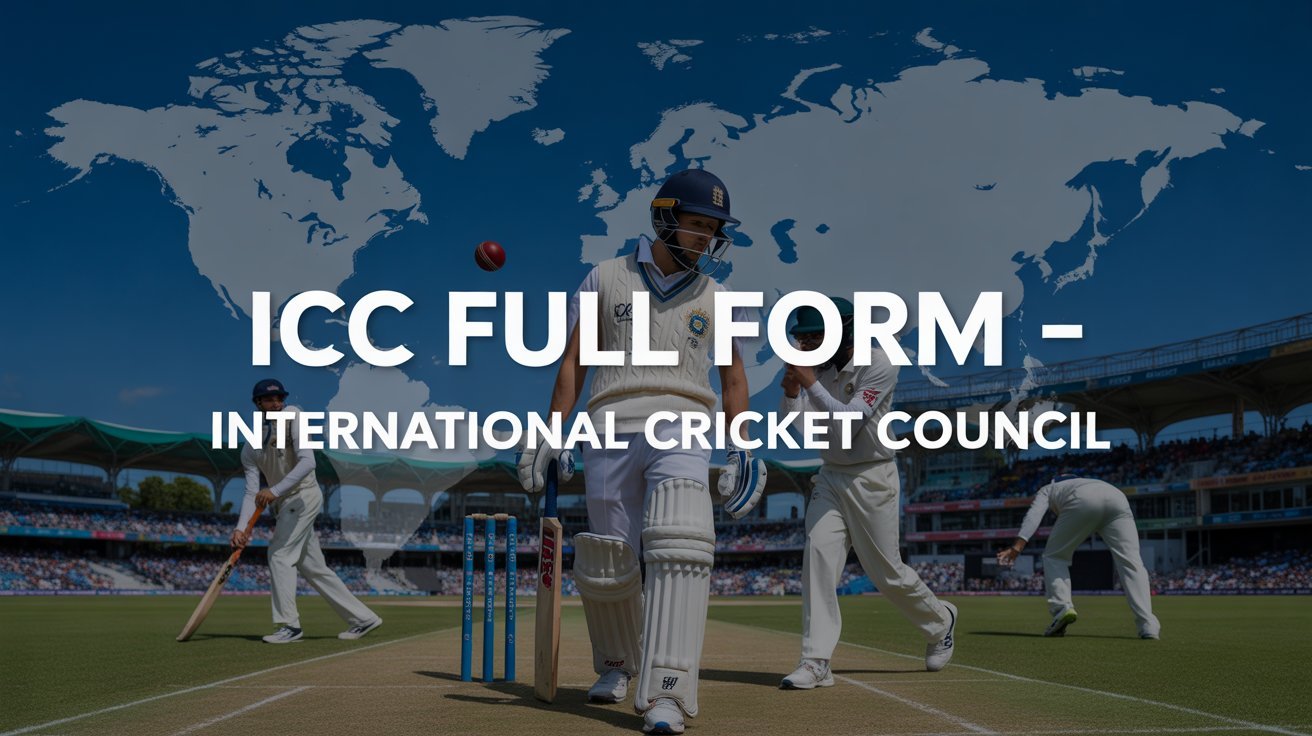What Is the ICC Full Form?
International Cricket Council is the full name of ICC. It is the international body that governs the sport of cricket and is the one that organizes the international tournaments, determines the standards of playing, and popularizes the sport all over the world. ICC plays a role of ensuring fair play, upholding the integrity of the sport, and administering global rankings and global tournaments that unify nations together.
A Brief History: From Imperial Cricket Conference to International Cricket Council
In 1965, the name was changed to the International Cricket Conference to include more member countries and reflect the sport’s growing international appeal.
Finally, in 1989, it became the International Cricket Council, emphasizing its global reach and role as the supreme authority for world cricket.
The ICC’s headquarters are located in Dubai, United Arab Emirates.
ICC Membership: Full and Associate Members
- Full Members: These are the major cricket-playing nations that are eligible to play Test matches. There are currently 12 Full Members, including India, England, Australia, South Africa, New Zealand, Pakistan, Sri Lanka, Bangladesh, Afghanistan, West Indies, Zimbabwe, and Ireland.
- Associate Members: These are countries where cricket is established but not yet played at the Test level. The ICC helps these nations with funding, infrastructure, and development programs to promote cricket globally.
Key Functions of the ICC
- Regulation of International Cricket
The ICC sets and maintains the official rules, standards, and playing conditions for all international matches — including Test, One-Day International (ODI), and Twenty20 formats. - Organizing Major Tournaments
The ICC conducts several prestigious tournaments, such as: ICC Cricket World Cup (50-over format) -
- ICC T20 World Cup
- ICC World Test Championship
- ICC Women’s Cricket World Cup
- Under-19 and regional qualifying tournaments
- Appointment of Umpires and Officials
The ICC appoints umpires, match referees, and technical officials for all international and ICC-sanctioned matches. - Integrity and Discipline
The ICC maintains strict codes of conduct for players and officials. It has an Anti-Corruption Unit (ACU) to prevent match-fixing and a strict anti-doping policy to ensure fair competition. - Global Development Programs
The ICC promotes cricket in emerging nations by investing in grassroots development, training coaches, building infrastructure, and funding national boards. - Rankings and Awards
The ICC maintains official rankings for teams and players across all formats. It also presents annual ICC Awards to recognize excellence in international cricket.
The ICC structure and Governance.
ICC has a set system of governance to ensure that its vast number of obligations are handled effectively.
- Full and associate member countries-Board of Directors: This is the highest decision-making body, whereby the representatives of the Full and Associate Member countries are included.
- ICC: Chairman and CEO: The ICC has a Chairman and Chief Executive Officer who is in charge of its overall operations and the direction the organization is taking.
- Committees: Different committees deal with particular aspects as finance, development, and regulations, to foster clarity and effectiveness in activities.
Significant Rules and Major Events.
The ICC has set clear structures and rules to make global cricket run smoothly. Among the main elements there are:
- Playing Conditions: These include match formats, overs, fielding limitations and usage of technology, including DRS (Decision Review System).
- Disciplinary Code: The code of the ICC provides the punishment of the mischief, field conduct and integrity violations.
- Anti-Corruption and Anti-Doping Policies: This is to ensure that the sport does not tarnish its image and also to ensure that there is fair play.
- Key Events: ICC hosts the key international events, such as the cricketing World Cup, T20 World Cup, and World Test Championships, amongst others, which are the key world events that attract the attention of the whole world and create enthusiasm among fans.
The Importance of the ICC: The Global Significance.
1. Standardization of Rules
ICC also makes sure that cricket is conducted in other nations in a similar set of rules, which is consistent and fair in all countries across the world.
2. Promotion of the Sport
ICC is tirelessly trying to popularize the sport by building the cricket presence in non-traditional countries and making the sport more popular all around the world.
3. Economic Impact
ICC tournaments have an enormous economic impact in terms of broadcasting rights, sponsorships, and tourism that make cricket a business sport at the global level.
4. Maintaining Integrity
The ICC protects the integrity of the sport of cricket by imposing strict anti-corruption and disciplinary policies.
5. Talent Development
The ICC assists the emerging players and countries through development programs and regional competitions to compete internationally.
Challenges and Criticisms Faced by the ICC
- Unequal Revenue Distribution: Smaller cricketing nations often feel that the revenue distribution system favors big boards like India, England, and Australia.
- Overcrowded Calendar: The increasing number of tournaments sometimes leads to player fatigue and affects the quality of cricket.
- Growth of Associate Nations: Despite efforts, Associate Members still struggle to get regular opportunities to play against top teams.
- Balancing T20 and Test Cricket: With the rise of franchise leagues, the ICC faces the challenge of maintaining the balance and importance of all formats.
Other Meanings of ICC
In the context of cricket, ICC is the name of a body, the International Cricket Council, but in other contexts, the abbreviation may be used to describe different organizations:
- International Chamber of Commerce- an international business organization that encourages international trade.
- International Criminal Court- a legal organization that investigates and prosecutes such serious crimes as war crimes and genocide.
In the sporting arena, however, ICC is known the world over as the International Cricket Council.
Conclusion
The International Cricket Council (ICC) forms the center of the world cricket. Since its formation in 1909, it has grown to be a small committee of a small number of cricketing nations to a global force with more than 100 members. The ICC is in charge of the rules and regulations of the sport, the sport tournaments, integrity and growth of the sport and this ensures that the sport of cricket remains alive and brings all fans together all over the world.
The ICC still upholds the culture of the game and the principle of fairness in the face of conflicting factors in the form of revenue inequality and time constraints. To the fans of cricket, it is an eye-opener to know what ICC’s full form is and what it does in bringing the future of international cricket.




Leave a Reply